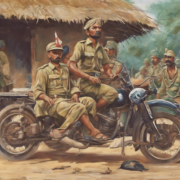Section 147 of the Indian Penal Code, 1860 pertains to “Punishment for rioting”. This section deals with the legal consequences for individuals involved in rioting, which is a serious offense against public tranquility and order. Let’s delve deeper into the meaning and punishment associated with IPC Section 147.
Meaning of IPC Section 147:
Under Section 147, the term “rioting” refers to the act of a group of individuals unlawfully engaging in violence or tumultuous behavior, disturbing the peace and endangering the safety of others. The essence of this offense lies in the collective nature of the act, where a group of people acts in concert to create a situation of violence and public disorder.
Elements of IPC Section 147:
For an offense to be considered as rioting under Section 147, the following elements must be established:
1. Assembly of Five or More Persons:
- The presence of five or more individuals is necessary to constitute rioting under this section. The collective nature distinguishes it from individual acts of violence.
2. Common Objective:
- The individuals involved must share a common intention to engage in violence or tumultuous conduct that disrupts public peace.
3. Use of Force or Violence:
- The group must resort to the use of force, violence, or threats of violence to achieve their common objective.
Punishment under IPC Section 147:
Upon conviction for rioting under Section 147, the individuals involved may face the following punishment:
- Imprisonment for a term which may extend to 2 years or with fine or with both.
In addition to imprisonment or fine, the court may impose a suitable penalty based on the severity of the offense and the specific circumstances of the case.
Aggravated Forms of Rioting:
In certain situations where the offense of rioting involves deadly weapons, grievous hurt, or endangering life or property, the punishment may be more severe under other sections of the IPC, such as Sections 148, 149, or 153. These sections provide for enhanced punishment to deter individuals from engaging in acts that pose a significant threat to public order and safety.
Case Law:
- State of Maharashtra v. Mohd Yakub:
In this case, the Supreme Court held that the offense of rioting under Section 147 requires a common object and participation of all individuals involved in the unlawful assembly. Mere presence at the scene of violence is not sufficient to establish the guilt of an individual for rioting.
FAQs (Frequently Asked Questions):
- What constitutes rioting under IPC Section 147?
-
Rioting involves the assembly of five or more persons with a common objective to engage in violence or tumultuous behavior that disrupts public peace.
-
What is the punishment for rioting under Section 147?
-
The punishment for rioting under Section 147 includes imprisonment for up to 2 years, fine, or both.
-
Can an individual be charged with rioting if they did not actively participate in the violence?
-
Mere presence at the scene of a riot may not be sufficient to establish the guilt of an individual for rioting. Active participation or a common object is crucial for conviction.
-
Are there any aggravated forms of rioting with enhanced punishment?
-
Yes, if rioting involves deadly weapons, grievous hurt, or endangers life or property, enhanced punishment may be applicable under other relevant sections of the IPC.
-
What is the importance of proving a common object in a charge of rioting?
- Establishing a common object is essential to differentiate between individual acts of violence and collective rioting. It helps in attributing liability to all individuals involved in the unlawful assembly.
In conclusion, IPC Section 147 serves as a crucial legal provision to address the menace of rioting and maintain public order and tranquility. It underscores the collective responsibility of individuals in upholding peace and harmony in society, deterrence being the key objective of the prescribed punishment. Understanding the nuances of this section is essential for legal practitioners, law enforcement agencies, and the general public to uphold the rule of law and prevent acts of public disorder.

